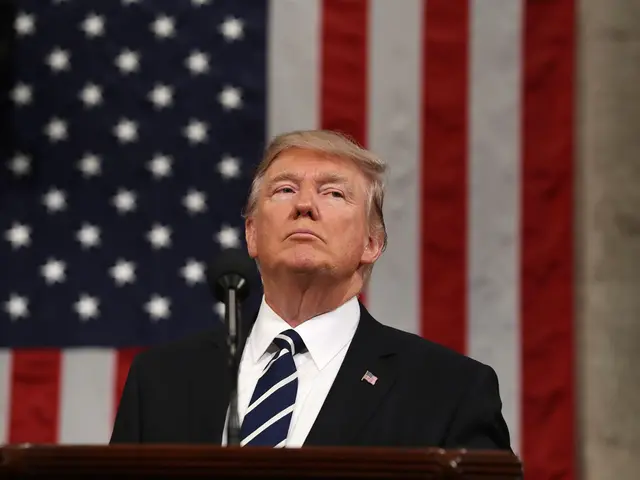US President Donald Trump has condemned Iran as a "fanatical regime" and refused to continue signing off on a landmark international nuclear deal.
In a combative speech on Friday, Mr Trump accused Iran of sponsoring terrorism and proposed new sanctions.
He said Iran had already violated the 2015 deal, which imposed curbs on Iran's nuclear capability in return for easing international embargoes.
International observers say Iran has been in full compliance with the deal.
Speaking at the White House, Mr Trump said he was acting in order to deny Iran "all paths to a nuclear weapon".
"We will not continue down a path whose predictable conclusion is more violence, more terror, and the very real threat of Iran's nuclear breakout," he said.
What does Trump's refusal to sign mean?
Congress requires the US president to certify every 90 days that Iran is upholding its part of the agreement. Mr Trump had already recertified twice, but refused to sign a third time ahead of a Sunday deadline.
Congress now has 60 days to decide whether to pull out of the nuclear deal by re-imposing sanctions.
Some advocates of the deal, signed between Iran and six international powers - the UK, US, Russia, France, Germany, and China - had feared that Mr Trump would withdraw the US entirely.
Instead he essentially passed the ball to Congress, which will now decide whether to rewrite the framework in accordance with Trump's wishes. The president made it clear that if it did not, he would cancel the deal.
"In the event we are not able to reach a solution working with Congress and our allies, then the agreement will be terminated," he said. "It is under continuous review and our participation can be cancelled by me, as president, at any time."
What changes does he want?
Mr Trump is seeking is the end to the nuclear deal's so-called "sunset clauses", one of which allows for the lifting of restrictions on Iran's nuclear enrichment programme after 2025.
He also called for new sanctions on Iran's elite Revolutionary Guards, which he called the "corrupt personal terror force of Iran's leader", and restrictions on Iran's ballistic missile programme, which is not covered by the deal.
Last month, Iran said it had successfully tested a new medium-range missile with a 2,000km (1,200-mile) range. The test was not internationally verified.
The president said that congressional leaders were already drafting amendments that would curb the ballistic missile development and eliminate expiry dates on restrictions to Iran's nuclear development.
Worshippers shouted anti-US slogans during Friday prayers in Tehran
How did key players respond?
Iranian President Hassan Rouhani said the US was "more than ever isolated" and could not change the nuclear deal.
"As long as our rights are guaranteed, as long as our interests are served, as long as we benefit from the nuclear deal, we will respect and comply with the deal," Mr Rouhani said.
Yukiya Amano, head of the International Atomic Energy Agency (IAEA), said Iran was implementing the deal and was subject to "the world's most robust nuclear verification regime".
European diplomats warned that any such unilateral changes to the agreement were likely to trigger the deal's collapse and a return to a nuclear standoff in the Middle East.
EU foreign policy chief Federica Mogherini called the deal "robust" and said there had been "no violations" by Iran. She said it was not in the power of "any president in the world" to terminate the agreement.
In a joint statement, the UK, Germany and France said they were "concerned" by Mr Trump's move but remained committed to the deal. They said they "shared concerns about Iran's ballistic missile programme and regional activities".
Russia said it remained committed to the deal and was opposed to the use of "aggressive and threatening rhetoric in international relations".
Israeli Prime Minister Benjamin Netanyahu congratulated Mr Trump, who he said had "boldly confronted Iran's terrorist regime". Saudi Arabia also backed the US president's "firm strategy".
(BBC)
 简体中文
简体中文

